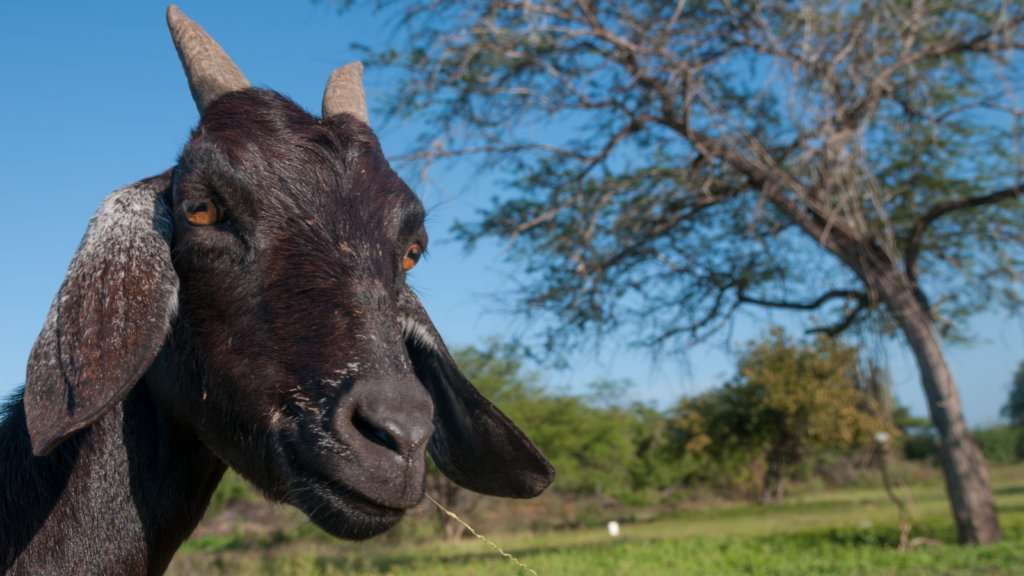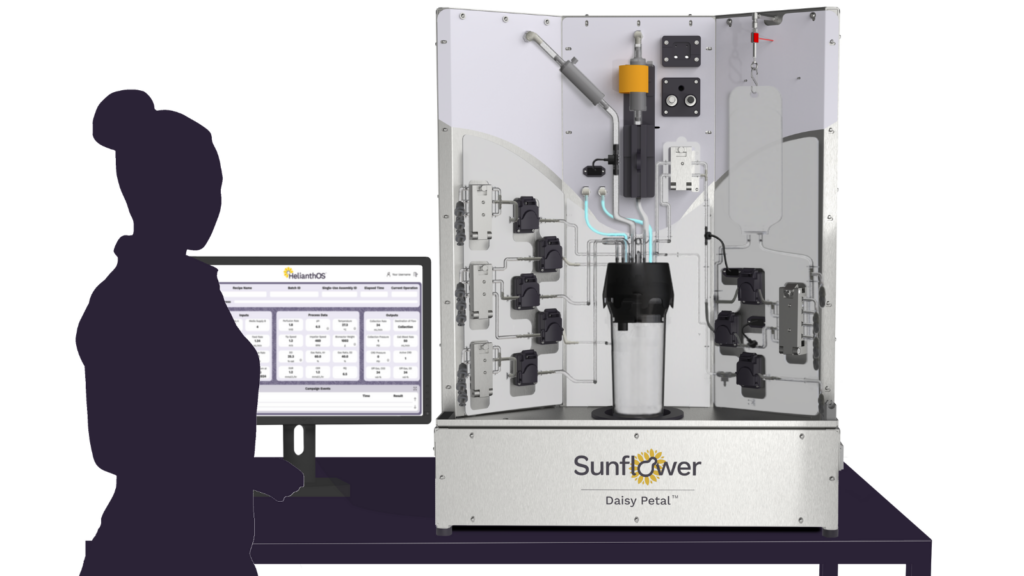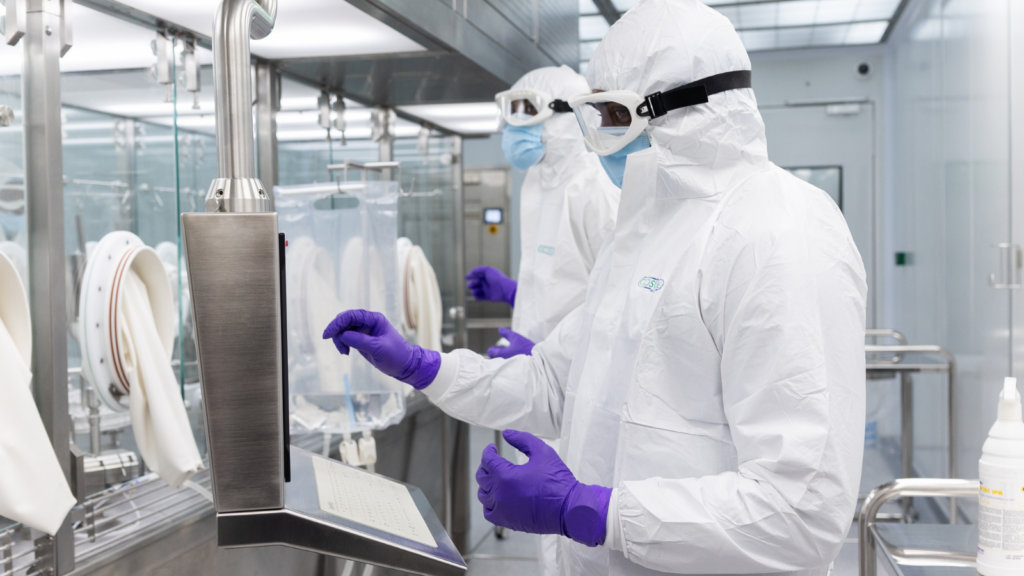September 16, 2024
Facing stubborn manufacturing challenges
Manufacturing proteins is notoriously expensive and complex. Will new ways of producing them come from continuous processes, Sunflowers, or even…goat milk?
By Michael Dumiak

Given the right artificial intelligence algorithms and enough resources, isolating proteins has become a relatively mundane task. But manufacturing proteins, either to serve as the vital ingredients of filled-and-finished vaccines or as stand-alone monoclonal antibody products, still requires complex bioreactors, specialized facilities, highly skilled people, fiendishly expensive ingredients, and long supply chains requiring support that just isn’t found in all environments — particularly in poorer and more remote areas.
“We don’t invest as much in reducing the cost of production as we do in designing vaccines,” says Mark Dybul, a Georgetown University professor of medicine, IAVI Board member, and former director of the Global Fund to Fight AIDS, Tuberculosis and Malaria.
Making vaccines and therapies more affordable is fundamental for getting them to more people. The costs of manufacturing and the difficulty and expense of using complex supply chains must change to make these goods more accessible to larger parts of the world in need, and to deliver them more quickly and fairly, says Zoltán Kis, a biotechnologist, bioprocess engineer, and senior lecturer at the University of Sheffield. Kis works on RNA vaccine manufacturing and production process modeling and has done research with the Future Vaccine Manufacturing Hub at the Centre for Process Systems Engineering at London’s Imperial College.
Production isn’t the only piece, but changing the dynamics of vaccine manufacturing could dramatically impact access. Even with the advent of “platform-based” or plug-and-play approaches to vaccine design, most notably the advent of mRNA vaccine platforms and the use of vectors such as cytomegalovirus or vesicular stomatitis virus, there are still many opportunities to reduce and optimize manufacturing processes. These include steady advances toward continuous bioprocessing, smaller-batch productions, and closed-system automation, all of which should lead to more efficient production because manufacturing lines can be multipurpose, more compact, and more flexible, at least theoretically.
Bulk vaccine manufacturing commonly requires pricey cell-based expression substrates and large-capacity bioreactors, a production series of steel stills that produce purified proteins under pristine conditions up to 15,000 or 20,000 liters at a time. The facilities that house these bioreactors are often, practically speaking, bespoke. The cost of building such a vaccine manufacturing plant is in the range of US$500 million and they are not particularly flexible in the variety of products they can manufacture.
But this month — in mid-September 2024 — the biotech development and manufacturing subsidiary Just-Evotec opens the doors on what it calls a J.POD at its Marie Curie campus in Toulouse, France. It is the firm’s second such site, each one taking a little over 18 months to build. The first opened outside Seattle in 2021.
J.PODs are built to be continuous bioprocessors. These systems vary from traditional manufacturing facilities in several ways. They are designed to produce multiple biological products within the same site. They are also smaller — the tanks are around 500 liters — and can produce small volumes of protein, just a few kilograms for early clinical trials, or metric tons for mass-market product supply. Using mammalian cell cultures, the J.PODS are also designed to make monoclonal antibodies and other biologics including virus-like particles and exosomes.
Just-Evotec launched as Just Biotherapeutics with the backing of the Bill & Melinda Gates Foundation in 2014. It was heavily funded by the U.S. Department of Defense during and after the COVID-19 pandemic and was bought by the Hamburg-based pharmaceutical manufacturer Evotec in 2019. Just-Evotec markets its J.PODs as a more economical approach to manufacturing, with a smaller footprint than traditional manufacturing facilities. An important bonus: they can be built quickly, and almost anywhere.
“We need solutions that can do more at smaller scales, and to automate processes so you need fewer highly skilled people to run them,” Kis says.

The continuous flow concept is also compelling to Kerry Love, one of the founders of the Boston-based biotech startup Sunflower Therapeutics, which produces a suite of bioprocessing equipment aimed at streamlining protein manufacturing using a process called perfusion fermentation. Working with her partner Christopher and several other colleagues at the Massachusetts Institute of Technology, and with support from the Bill & Melinda Gates Foundation and the Defense Advanced Research Projects Agency, the Sunflower team spent years experimenting with Pichia pastoris — industrial yeast — which led to developing bioreactor prototypes that went out for live testing to academic laboratories in 2022.
The continuous perfusion fermentation vessels designed by Sunflower enable longer production campaigns and the continual harvest of secreted proteins. “We often say that yeast cells are like little babies: they like to eat all the time, and they like to have their diaper changed all the time,” she says. “Nobody likes to sit in their dirty bathwater.”
Daisy Petal, Sunflower’s small-batch, benchtop, one-liter perfusion bioreactor system, can produce 50,000-100,000 dose equivalents of protein-based vaccine in each campaign. Sunflower has just sold its first five production Daisy Petal units to a vaccine developer in the Global South.
But how about a bioreactor with a heart?
Over the last decade in Liège, Belgium, a team of researchers at a startup called Bio-Sourcing has worked to develop a platform for expressing proteins including monoclonal antibodies that can be harvested from the milk of genetically engineered goats. They’re calling this the BioMilk platform and it is starting to gain attention, as have other alternative expression systems using algae, tobacco, or cow’s milk.
The Bio-Sourcing team toured South Africa last year and met Petro Terblanche, chief executive of Afrigen, the Cape Town-based biotech leading a World Health Organization (WHO) initiative to boost vaccine manufacturing capabilities on the continent. Terblanche was initially hesitant, but her interest was piqued when she heard Bio-Sourcing mention two U.S. Food and Drug Administration-approved treatments produced from transgenic animals (the anticoagulant antithrombin made in Massachusetts by rEVO Biologics, and an angioedema treatment for acute hives). Terblanche agreed to partner on a pilot project in South Africa to see if goat milk might help fill a serious gap in African manufacturing capabilities.

“Under two percent of monoclonal antibodies made in the world are produced on the African continent. Under two percent,” she emphasizes.
Goat milk is intriguing, but her primary goal is local manufacturing. Local production would go a long way to improving accessibility. Afrigen is deeply involved in bringing mRNA research and development to South Africa and working with crosstown partner Biovac to boost manufacturing capabilities for the vast sub-Saharan regions of the continent.
Vaccine delivery during the COVID-19 pandemic starkly illuminated access problems on a mass scale. The current mPox virus outbreak echoes the same issues. mPox vaccines reached Nigeria at the end of August, with 10,000 doses donated by the U.S. government. They did not arrive in the Democratic Republic of Congo — where parts of the country are enduring the worst of what the WHO has declared a public health emergency — until the weekend of Sept. 7. The virus has been circulating in these parts of the Congo at concerning levels since January 2023.
There are many reasons for the sluggish arrival of mPox vaccines, including bureaucracy, supply chain issues, and slow purchase orders. Shoring up local capacity to produce and manufacture vaccines is another key factor. In mid-August, the Africa Centers for Disease Control and Prevention (ACDC) and Danish company Bavarian Nordic, which manufactures an mPox vaccine, announced partnerships to produce the vaccine locally, at a lower price per dose.
Local manufacturing is a critical component to lowering cost and improving access for many other products too, which is why Terblanche is willing to take a closer look at transgenic goat milk. “If we can reduce the cost of one of the leading anti-cancer monoclonal antibodies by 50%, we could increase the access for the continent by 100%,” Terblanche says. “That’s what drives me.”
Michael Dumiak, based in Berlin, reports on global science, public health, and technology.
Read more:
- Transgenic goats producing an improved version of cetuximab in milk
- Stanley Plotkin, James Robinson and colleagues on the complexity and cost of vaccine manufacturing
- White paper on continuous bioprocessing. May 20-21, 2014 Continuous Manufacturing Symposium
- Advanced Biopharmaceutical Manufacturing: An Evolution Underway
- Vaccine Process Technology: A decade of progress
- Continuous Manufacturing